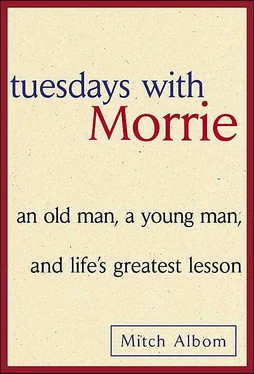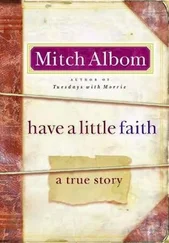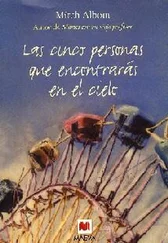“It’s all part of the same problem, Mitch,” Morrie said. “We put our values in the wrong things. And it leads to very disillusioned lives. I think we should talk about that.”
Morrie was focused. There were good days and bad days now. He was having a good day. The night before, he had been entertained by a local a cappella group that had come to the house to perform, and he relayed the story excitedly, as if the Ink Spots themselves had dropped by for a visit. Morrie’s love for music was strong even before he got sick, but now it was so intense, it moved him to tears. He would listen to opera sometimes at night, closing his eyes, riding along with the magnificent voices as they dipped and soared.
“You should have heard this group last night, Mitch. Such a sound!”
Morrie had always been taken with simple pleasures, singing, laughing, dancing. Now, more than ever, material things held little or no significance. When people die, you always hear the expression “You can’t take it with you.” Morrie seemed to know that a long time ago.
“We’ve got a form of brainwashing going on in our country,” Morrie sighed. “Do you know how they brainwash people? They repeat something over and over. And that’s what we do in this country. Owning things is good. More money is good. More property is good. More commercialism is good. More is good. More is good. We repeat it—and have it repeated to us—over and over until nobody bothers to even think otherwise. The average person is so fogged up by all this, he has no perspective on what’s really important anymore.
“Wherever I went in my life, I met people wanting to gobble up something new. Gobble up a new car. Gobble up a new piece of property. Gobble up the latest toy. And then they wanted to tell you about it. ‘Guess what I got? Guess what I got?’
“You know how I always interpreted that? These were people so hungry for love that they were accepting substitutes. They were embracing material things and expecting a sort of hug back. But it never works. You can’t substitute material things for love or for gentleness or for tenderness or for a sense of comradeship.
“Money is not a substitute for tenderness, and power is not a substitute for tenderness. I can tell you, as I’m sitting here dying, when you most need it, neither money nor power will give you the feeling you’re looking for, no matter how much of them you have.”
I glanced around Morrie’s study. It was the same today as it had been the first day I arrived. The books held their same places on the shelves. The papers cluttered the same old desk. The outside rooms had not been improved or upgraded. In fact, Morrie really hadn’t bought anything new—except medical equipment—in a long, long time, maybe years. The day he learned that he was terminally ill was the day he lost interest in his purchasing power.
So the TV was the same old model, the car that Charlotte drove was the same old model, the dishes and the silverware and the towels—all the same. And yet the house had changed so drastically. It had filled with love and teaching and communication. It had filled with friendship and family and honesty and tears. It had filled with colleagues and students and meditation teachers and therapists and nurses and a cappella groups. It had become, in a very real way, a wealthy home, even though Morrie’s bank account was rapidly depleting.
“There’s a big confusion in this country over what we want versus what we need,” Morrie said. “You need food, you want a chocolate sundae. You have to be honest with yourself. You don’t need the latest sports car, you don’t need the biggest house.
“The truth is, you don’t get satisfaction from those things. You know what really gives you satisfaction?” What?
“Offering others what you have to give.”
You sound like a Boy Scout.
“I don’t mean money, Mitch. I mean your time. Your concern. Your storytelling. It’s not so hard. There’s a senior center that opened near here. Dozens of elderly people come there every day. If you’re a young man or young woman and you have a skill, you are asked to come and teach it. Say you know computers. You come there and teach them computers. You are very welcome there. And they are very grateful. This is how you start to get respect, by offering something that you have.
“There are plenty of places to do this. You don’t need to have a big talent. There are lonely people in hospitals and shelters who only want some companionship. You play cards with a lonely older man and you find new respect for yourself, because you are needed. “Remember what I said about finding a meaningful life? I wrote it down, but now I can recite it: Devote yourself to loving others, devote yourself to your community around you, and devote yourself to creating something that gives you purpose and meaning.
“You notice,” he added, grinning, “there’s nothing in there about a salary.”
I jotted some of the things Morrie was saying on a yellow pad. I did this mostly because I didn’t want him to see my eyes, to know what I was thinking, that I had been, for much of my life since graduation, pursuing these very things he had been railing against—bigger toys, nicer house. Because I worked among rich and famous athletes, I convinced myself that my needs were realistic, my greed inconsequential compared to theirs.
This was a smokescreen. Morrie made that obvious. “Mitch, if you’re trying to show off for people at the top, forget it. They will look down at you anyhow. And if you’re trying to show off for people at the bottom, forget it. They will only envy you. Status will get you nowhere. Only an open heart will allow you to float equally between everyone.”
He paused, then looked at me. “I’m dying, right?” Yes.
“Why do you think it’s so important for me to hear other people’s problems? Don’t I have enough pain and suffering of my own?
“Of course I do. But giving to other people is what makes me feel alive. Not my car or my house. Not what I look like in the mirror. When I give my time, when I can make someone smile after they were feeling sad, it’s as close to healthy as I ever feel.
“Do the kinds of things that come from the heart. When you do, you won’t be dissatisfied, you won’t be envious, you won’t be longing for somebody else’s things. On the contrary, you’ll be overwhelmed with what comes back.”
He coughed and reached for the small bell that lay on the chair. He had to poke a few times at it, and I finally picked it up and put it in his hand.
“Thank you,” he whispered. He shook it weakly, trying to get Connie’s attention.
“This Ted Turner guy,” Morrie said, “he couldn’t think of anything else for his tombstone?”
“Each night, when I go to sleep, I die. And the next morning, when I wake up, I am reborn.”
Mahatma Gandhi
The Ninth Tuesday We Talk About How Love Goes On
The leaves had begun to change color, turning the ride through West Newton into a portrait of gold and rust. Back in Detroit, the labor war had stagnated, with each side accusing the other of failing to communicate. The stories on the TV news were just as depressing. In rural Kentucky, three men threw pieces of a tombstone off a bridge, smashing the windshield of a passing car, killing a teenage girl who was traveling with her family on a religious pilgrimage. In California, the O. J. Simpson trial was heading toward a conclusion, and the whole country seemed to be obsessed. Even in airports, there were hanging TV sets tuned to CNN so that you could get an O.J. update as you made your way to a gate.
I had tried calling my brother in Spain several times. I left messages saying that I really wanted to talk to him, that I had been doing a lot of thinking about us. A few weeks later, I got back a short message saying everything was okay, but he was sorry, he really didn’t feel like talking about being sick.
Читать дальше












